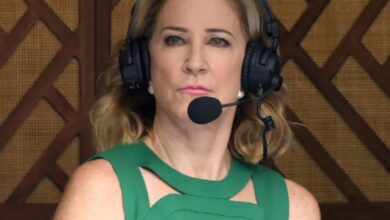Priscilla Presley’s memoir Elvis and Me: The True Story of the Love Between Priscilla Presley and the King of Rock N’ Roll released way back in 1985. Why did you think of adapting it into a biopic now, 38 years later?
Coppola wins with her honest portrayal of the woman (read: child) living in the shadow of “The King.” Lmoment. This year, it’s Priscilla’s turn. The former wife of the late King of Rock N’ Roll smiled in support along the summer press tour for Baz Luhrmann’s 2022 film Elvis, giving the biopic the Presley family blessing. By September of that year, she had greenlit another project about that period of her life, this time with an entirely different tone.
One could say this is Elvis (Priscilla’s Version), but this writer has already plugged that joke into a number of stories.
With Elvis, Priscilla and culture at large gave Elvis Presley his flowers, now she’s showing us the thorns.
Priscilla, which hit select theaters on October 27 and is in wide release today, is the latest film out of the A24 hit factory and the latest work of legacy writer-director Sofia Coppola. The story is based on Priscilla Presley’s 1985 memoir Elvis and Me, and stars Cailee Spaeny and Jacob Elordi, who managed to nail the accent without keeping it for eternity.
The film, like its source text, follows Priscilla over the course of 12 years, from age 15 to 27, digging into her early years with Elvis, the nitty gritty of their marriage, and the details surrounding their eventual divorce. More than a simple biopic about a woman who would go on to define style, beauty, and culture in the 1960s, at the hands of Coppola, Priscilla is a film about the female experience. As Vulture’s Alison Willmore stated, “Sofia Coppola makes films about sad, wealthy white women the way that Martin Scorsese makes movies about gangsters.”
With films like The Virgin Suicides, Marie Antoinette, Lost in Translation, and The Bling Ring, the film industry’s most beloved nepo baby has built a career using her power for relative good – making films about privilege, wealth, femininity, and loneliness. We call that the Poor Little Rich Girl special. A case of nepotism gone right, the filmmaker is at her best when she’s depicting women in the shadows of men, and what better muse than Priscilla Presley.
The true story behind Priscilla is really just an autobiography of the icon’s life, but we’ll give you the SparkNotes. Priscilla was raised as an Army brat, moving across the globe every few years. At age 14, she lived with her family in Germany. This is where she met Elvis, 24 at the time and in the middle of his military service. They spent the next few years falling in love, writing letters from across the world, until her parents let her move to Memphis in 1963. She enrolled in an all-girls school, moved in with Elvis’ parents, and eventually into Graceland after Elvis ensured her parents that he planned to marry their daughter.
Fast forward a bit, the pair got married in 1967 when Priscilla was 21, though according to Presley’s memoir, waited until their wedding night to have sex. Not long after the wedding, Priscilla learned she was pregnant with the couple’s only child, Lisa Marie, who tragically passed away of cardiac arrest in 2022. Presley recounts in her book that the pair were apprehensive about having a child so early on, and even considered abortion before ultimately deciding to go through with the pregnancy.
The Presley’s relationship endured a string of rumored affairs on each of their parts, but the one that really broke the camel’s back was Priscilla’s relationship with her karate instructor Mike Stone. Priscilla and Elvis separated in 1972, and filed for divorce on Elvis’ birthday, January 8, 1973. The absolute picture of divorced bliss, Elvis and Priscilla walked out of the courthouse hand in hand and remained close friends until the artist’s death in August 1977.
The story of Priscilla Presley, and ultimately of Priscilla, is one of a child pushed into Aquanet-misted adulthood, domesticity, and unimaginable fame at an age when most of us were practicing three-point turns.
With Priscilla, Coppola expertly tows a very thin line – one that doesn’t villainize nor idolize Elvis Presley. In fact, the filmmaker even stated that the film really wasn’t for Elvis fans. Come for Priscilla, come for Sofia, leave enlightened.
Priscilla is playing in select theaters now, and everywhere on November 3



